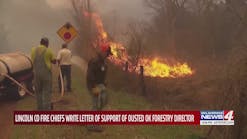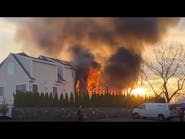Insurers Cutting Workers' Comp. for Pa. Firefighters
Source The Times-Tribune, Scranton, Pa.
April 29--Insurers are pulling workers' compensation coverage from cash-strapped municipalities in response to a 2011 law linking firefighting with increased cancer risks.
Dubbed the Firefighters Cancer Presumption Act, Act 46 of 2011 recognizes every form of cancer found in a firefighter as a work-related illness. The onus to prove otherwise is on the municipality. Before the law, a claim could be filed going back 300 weeks. The law doubled that to 600 weeks.
Anticipating an onslaught of claims, insurers are pulling out, including MRM Trust, which provided Clarks Summits' volunteer firefighters with workers' compensation, Borough Manager Virginia Kehoe said.
"They were anticipating so many claims," Ms. Kehoe said. The borough turned to the State Workers' Insurance Fund and is now paying roughly $19,000 a year. Before Act 46, the borough was paying $14,000 a year.
Courtney Accurti, a spokeswoman for the Pennsylvania State Association of Boroughs said she has heard from multiple municipalities that have been dropped by insurers as claims rise. Elam Herr, assistant executive director at the Pennsylvania State Association of Township Supervisors said private carriers and insurance trusts have been dropping workers' compensation for firefighters or substantially hiking premiums.
Scranton's firefighter workers' compensation falls to the city as the city self-insures, business administrator Ryan McGowan said. The city pays claims out of a dedicated account. No claims have been filed since the law passed, so the law has not affected the city so far, he said.
Dunmore also has not been affected, Councilman Paul Nardozzi said. The borough's firefighter workers' compensation provider is still on board, but Mr. Nardozzi said officials have raised concerns over potentially higher premiums with the provider. So far, the line is holding, he said.
Honesdale and its volunteer fire department contacted at least four insurance providers since being dropped, said Scott Smith, chairman of the borough's finance committee. Each provider contacted said they no longer provide workers' compensation for fire crews.
"Because of the financial risk to the companies suddenly having all these claims, they are choosing not to do the workers' compensation," Mr. Smith said.
Many are choosing the State Workers' Insurance Fund for firefighters workers' compensation because it is deemed the most cost-effective way to provide the state-mandated coverage. Using SWIF for firefighter coverage allowed Clarks Summit to keep MRM coverage for everything else, Ms. Kehoe said.
Clarks Summit recently received $33,000 from two dividend rebate checks from MRM. If the borough had dropped MRM all together, it might not have been able to secure a comparable deal, Ms. Kehoe said. This became clear when the borough began shopping for quotes from other providers.
"We actually had one quote come in a little bit lower (than MRM)," she said. "But when you take into account the rebate check, it didn't even come close."
Robert Anspach, director of Insurance Services with PennPRIME Workers' Compensation Trust, raised providers' concerns at a Nov. 14 hearing before the House Veteran Affairs and Emergency Preparedness Committee.
"Every insurance entity has a reserve that is based on past experience and actuarial estimates of future costs for claims that will be discovered and reported later," he said. "Premiums are collected with an understanding that, based on the history of the trust or company, losses will be paid out generally within a range of expected outcomes.
"The increase of the reporting time from 300 to 600 weeks means there were 300 weeks for which no cancer claims were anticipated and, therefore, no premium was collected."
Fewer claims were filed prior to law because medical proof was required without a presumption, Mr. Anspach said.
"No reserve, therefore, was set aside for these Act 46 claims. The modeling we were seeing did not bode well for keeping losses at a level that were manageable."
Lawmakers who support the law have balked at talk of making modifications.
"I support the measure in its entirety and would not support tweaks to the statute that protects our paid and volunteer firefighters who in turn protect our communities," said Rep. Kevin Haggerty, D-112, Dunmore. "To say that those who are charged with protecting public safety are too costly for insurance carriers is an insult; especially those who volunteer to keep our families and communities safe and in doing so, have contracted cancer."
Don Konkle, executive director of the Pennsylvania Fire and Emergency Services Institute, said lawmakers have a responsibility to look out for firefighters.
"We believe that protecting firefighters from financial ruin for doing their job is just good policy," he said.
Contact the writer: [email protected], @jkohutTT on Twitter
Copyright 2013 - The Times-Tribune, Scranton, Pa.





